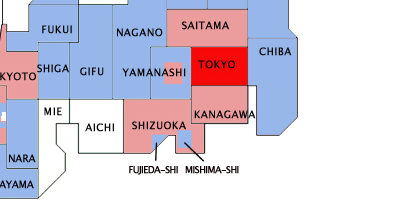It Takes Selfishness to Refuse Rubble
Below, I translate an article by Nobuo Ikeda, Japanese economist and noted commentator on nuclear issues in the Japan blogosphere. This article and its translation are released under a Creative Commons BY-NC license.

I thought that opposition to nuclear power is not about individual concerns but an overriding sense of “moral duty”, but it seems like recently it’s shown itself to be simple selfishness. The local citizens’ brigade to “halt the scattering of radiation” list the towns and cities which have received rubble from the earthquake as part of an effort to stop all rubble from being buried.
As explained by Taro Kono, most of the areas devastated by the tsunami were unaffected by the Fukushima Daiichi accident and it thus makes no sense to refuse all rubble from Tohoku. The radiation in most of Tohoku is no different from Tokyo or Yokohama. Without the ability to clear the rubble and dirt from Tohoku, the reconstruction of the affected areas will hit a brick wall. Even Osaka City Mayor Hashimoto, who was stirring up fears about radiation last year, agrees that rubble does not have any problematic level of radiation.
On this citizens’ brigade website, there is a “doctor’s written opinion on accepting rubble into your hometown” which states that “regulations must be strengthened to 10 becquerels per kilogram”. The basis of this is an article written by one Yuri Bandashevsk. Cesium-137 is said to cause “functional modifications in the cardiovascular, nervous, endocrine, immune, reproductive, digestive, urinary excretion and hepatic system,” but the only evidence given for this is experiments made on rats! [Actually, if you merely glance at the linked article, you’ll see that Mr. Bandashevsk is clearly unqualified to do this kind of evaluation. –Avery]
Zero-risk fundamentalism like this makes it impossible to evaluate risk quantitatively. Looking at a page like this, you might be led to believe that “radioactive pollution is worse than an atomic bomb”, but in fact Fukushima Prefecture found that 99.8% of residents of evacuated areas will receive a real dose of less than 1 millisievert throughout their lifetime. I’d like to see the three self-styled physicists who wrote this opinion make a quantitative evaluation of the effects of 1 millisievert of radiation over a span of 50 years.
The anti-nuclear movement claims the great moral duty of protecting the environment, but trying to block the importation of rubble has nothing to do with this moral duty, but is rather based in the selfish principle, “I don’t care what happens to the victims of the tsunami, but I want zero risk in my backyard.” Yukio Hayakawa and Kunihiko Takeda, who torment an entire prefecture with vitriol like “Fukushima’s produce is poison,” operate on the same principle. When the movement becomes this depraved it is only a matter of time before it dissolves entirely.
Posted: February 5th, 2012 | Japan 1 Comment »

Ten bequerels per kilogram? Where are they going to bury their dead, with the human body being around 100 bequerels per kilogram?